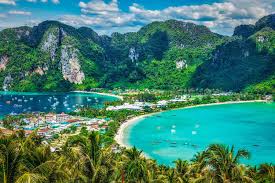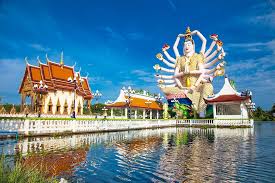Thailand, formerly known as Siam, is a country located in Southeast Asia on the Indochina Peninsula, bordered by Laos and Cambodia to the east, the Gulf of Thailand and Malaysia to the south, and the Andaman Sea and Myanmar to the west. Thailand is administratively divided into 75 provinces, which in turn are divided into districts and municipalities, in addition to the capital of the Kingdom of Thailand, Bangkok, which is a special administrative region and the country’s capital and largest city.
Thailand’s population is estimated at about 66 million people, which places it 20th in the world according to population. Thailand is also known by its former name “Siam”, and this was the official name of the country until May 11, 1949. The word “Tai” means free in the Thai language. Derived from the same word (Tai), the word that applies to the population, that is, Thais. Some minorities in the country use the word Siamese when referring to the country’s population.
The system is a constitutional monarchy, the country is ruled by King Rama X, the tenth king of the Chakri dynasty, who has owned it since 2016.
Thailand ranks 51st in the world in terms of total area, with an area of about 513,120 km2, and is ranked 20th in terms of population, 64 million. The capital and largest city is Bangkok, which is the political, commercial, industrial and cultural center of Thailand. About 75% of the population is ethnically Thai, 14% Thai-Chinese, and 3% Malay; the remainder belong to minorities that include the Mon, Khmer, and various hill tribes. The official language in the country is Thai. The main religion is Buddhism, which is professed and practiced by about 95% of the population.
Thailand witnessed rapid economic growth between 1985 and 1996, and is now considered a newly industrialized country. Tourism also contributes significantly to the Thai economy. There are approximately 2.2 million legal and illegal immigrants in Thailand and the country has also attracted a large number of expatriates from developed countries.
Tourism in Thailand is a major income for the state, with an estimated contribution of the tourism sector to the gross domestic product at 6.7% in 2007.
In 2008, the capital, Bangkok, ranked third, after London and New York, in the list of “top destinations for world cities” by Euromonitor, a specialized research company, with 10,209,900 visitors. The city of Pattaya ranked twenty-third, with 4,406,300 visitors, then Phuket Island ranked thirty-first, with 3,344,700 registered, and Chiang Mai ranked 78th, with 1,604,600 visitors.
According to the Tourism Authority of Thailand, 55% of tourists in 2007 came from the Asia-Pacific region
Thai culture was shaped by many factors, including religious beliefs primarily through spirituality, Hinduism, Buddhism, and cultural identity that was greatly influenced by ancient India, China, Cambodia, and Southeast Asian cultures, as well as many immigrations from China and India.
The Thai language is the official language of the country, and it has a special alphabet that ranks the Thai language globally 45 and is spoken by nearly 60 million people. The Thai language is the mother tongue of the Thai people, who are the dominant ethnic group in Thailand. The Thai language is part of the Tai group of the Thai-Kadai language family. The Tai-Kadai languages are believed to have originated in what is now southern China, and some linguists have suggested connections to the Austroasiatic, Austronesian, or Sino-Tibetan language families. It is a tonal and analytical language. It has a consistent set of tones, complex orthography, relational signs and distinct sounds, making it difficult to learn for those who do not speak a related language.
About 94.6% of the population embraces the Buddhist religion, according to the last census in the year (2000), and they adhere to the Theravada doctrine. Muslims represent 4.6% , while there is a Hindu minority in Thailand and is often located in major cities, while Christianity represents 0.7% of the population, which has a long history in Thailand, where European missionaries came in 1550, and the state currently supervises educational and social institutions Christian and provides nominal funds to programs for Christian groups.
Muslims spread in Thailand, where statistics indicate that they are between 2.2 million to 7.4 million, and they are spread in the southern regions. Most Thai Muslims follow the doctrine of the Sunnis and the Community, and they have a separate history from the history of Thailand. The four southern provinces were part of the Pattani kingdom. And these Muslims are of the Malay race, and they speak Bahasa, and write it in the Arabic alphabet, and there are 3,494 mosques in Thailand. There are many of them in southern Thailand, and there are approximately 170 mosques in the capital, Bangkok.



